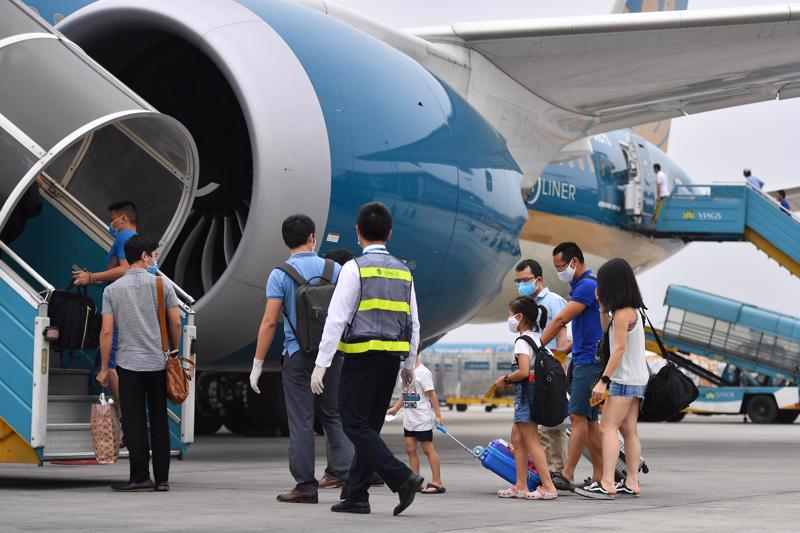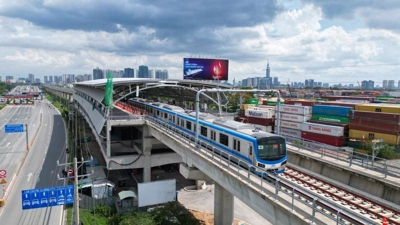Domestic airfare prices to cool down
Rising domestic airfares have had a dampening effect on travel within Vietnam this year, with tourist numbers falling and many looking at overland travel. The airfares have to come down as a result.

Summer is the peak season for almost all tourism companies, not just in Vietnam but globally, with revenue in these warmer months generally accounting for 40-70 per cent of the annual total. Compared to previous years, this year is expected to see significant changes in tourism offerings in Vietnam, to cater to changing customer preferences and mitigate the issue of rising airfares.
During the recent April 30 - May 1 holiday, the local tourism market exhibited certain trends in travel demand. As it is estimated that airfares represent 30-50 per cent of a holiday’s cost, higher airfares directly impact holiday plans and, hence, tourism companies, who must adjust their strategies to meet customer preferences and budgets.
Change in direction
According to the Civil Aviation Authority of Vietnam (CAAV), average economy class tickets on a number of domestic routes, including taxes and fees, with Vietnamese airlines have been higher since the beginning of this year compared to the same period of 2023. For example, Hanoi - Ho Chi Minh City flights with Vietnam Airlines cost approximately VND2.64 million ($103), up 14 per cent, with Vietjet Air around VND1.74 million ($68), up 25 per cent, with Bamboo Airways some VND2 million ($78), up 11 per cent, and with Vietravel Airlines roughly VND1.5 million ($59), up 15 per cent.
Even on “ordinary” days, outside of peak periods like public holidays and the summer, domestic ticket prices have soared, with a flight within Vietnam’s borders often costing more than heading abroad. For example, flights from Hanoi to Phu Quoc Island range from VND7 to 9 million ($275 to $353), for which travelers could enjoy a five-day, four-night all-inclusive trip to Thailand.
Indeed, rising airfares affected tourist numbers during the recent holidays. Ho Chi Minh City’s Tan Son Nhat International Airport catered to a total of 3,961 flights over the April 30 - May 1 break, averaging 660 a day, down 8.8 per cent compared to 2023 and 10 per cent compared to pre-pandemic 2019.
Ms. Tran Thi Bao Thu from Vietluxtour said the current surge in airfares is a source of concern for all travel companies and present a potential threat to earnings during this year’s summer season. Travel by road actually rescued many in the tourism sector during the recent holidays.
Of a similar mind, Mr. Bui Thanh Tu, Chief Marketing Officer at BestPrice Travel, predicted that attractive beach destinations nearby major cities will draw in the most visitors this year. With airfares soaring during the peak summer season and showing no signs of abating, travelers are likely to opt for nearby destinations, viewing car, bus, or train travel as viable alternatives.
According to a representative from BenThanh Tourist, domestic flight and holiday packages are expected to see prices rise 20-30 per cent this summer. Faced with the challenge of waiting for airfares to stabilize, travel agencies are devising strategies to leverage domestic road networks, capitalize on new expressways, and even offer packages that offer outward travel by train, for scenic exploration, and a return by air.
Many travel companies believe traditional tours may gradually give way to retail service models like airline tickets combined with hotel bookings. Though this model has experienced significant growth post-pandemic, travel agencies are now encountering competition from online platforms.
Mr. Le Hong Thai, Director of the Hanoitourist Travel Company, observed that, at present, domestic tour bookings are only about 80 per cent of the figure this time last year, with most fully-booked tours being short-haul trips.
Similarly, Mr. Tran Dang Thanh, CEO of Orion Travel, said his company is focusing more on selling tours abroad to ensure revenue streams. “Domestic tours relying on air travel are still experiencing low customer demand, even as the peak summer season approaches,” he explained. “If airfares remain high, the impact will be even more serious.”
Limiting the impact
The Ministry of Transport (MoT) and the CAAV recently began conducting inspections of airlines, through which it was observed that all carriers have openly declared their ticket prices, as required by the Ministry. “In inspections of eleven cases related to ticket prices, there were no instances of prices higher the framework regulated in Circular No. 17 and Circular No. 34,” a representative from the CAAV said.
During the recent 33rd session of the National Assembly (NA) Standing Committee, Deputy NA Chairman Tran Quang Phuong asked the MoT and the Ministry of Finance whether ticket prices will see further increases and how this may affect the economy and the tourism sector.
In response, Deputy Minister of Transport Nguyen Danh Huy explained that certain factors have contributed to the situation. Firstly, fuel prices are rising and exchange rates are fluctuating, while 65-70 per cent of the cost of each flight goes to fuel. Moreover, aircraft shortages compel carriers to lease both the plane and its pilots, resulting in escalating expenditures.
The Deputy Minister added that the MoT has introduced a range of measures to comprehensively reassess declared costs. These measures entail increasing the number of overnight flights and utilizing wide-body aircraft as narrow-body aircraft remain scarce. “We have been encouraging airlines to minimize costs as much as possible while exploring options to cut various fees, ensuring that the public’s travel needs are met in a reasonable manner,” he told the NA.
In regard to other solutions, the MoT has expanded train timetables and introduced new rail routes to meet needs and address the shortage of narrow-body aircraft. “In a broader context, rail transport remains the most cost-effective option for distances under 1,000 km, while air travel is preferable for distances exceeding 1,000 km,” Deputy Ministry Huy said. “The MoT is actively promoting the efficient operation of existing rail lines and investing in new infrastructure to ensure a sustainable and rational restructuring of Vietnam’s passenger transport market.”
The CAAV, meanwhile, has introduced measures to ease any adverse effects on flight operations. In regard to slot coordination for takeoffs and landings, adjustments have been made to fine-tune parameters, facilitating the efficient operations of airlines by boosting the number of flights and capacity on different routes.
Airlines have also taken steps to address the issue of lower capacity, including changes to takeoff and landing times at international airports, to shorten aircraft turnaround times, increasing the number of flights conducted after 10pm, and optimizing operation times throughout the day.
The CAAV has also advised travelers to plan their trips early, stay informed about airlines’ plans, make any necessary changes to their arrangements, and choose their tickets wisely. It has also encouraged airlines to promptly share information on promotional programs and fare discounts to enhance communications efforts and ensure that customers are able to select and buy appropriate tickets.







